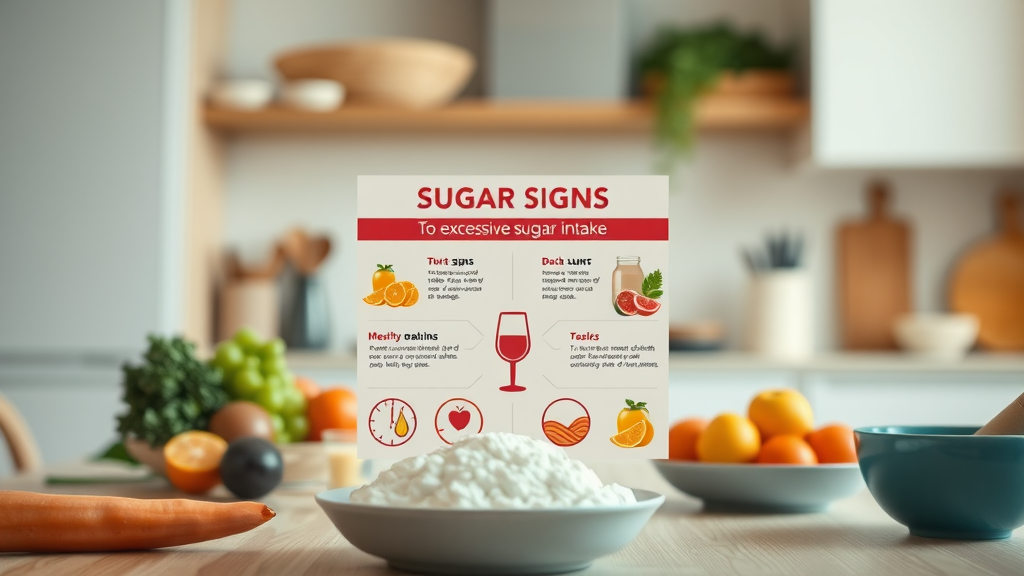Are you tired of feeling sluggish and battling cravings that seem impossible to conquer? You're not alone! Reducing sugar intake is a challenge many face, but it’s also a gateway to a healthier, more vibrant life. In "Struggling to Reduce Sugar Intake? Here’s Your Solution!", we’ll dive into the science behind sugar addiction, share practical tips to curb those sweet temptations, and reveal the incredible benefits of cutting back. Join us on this journey to reclaim your energy and well-being—your body will thank you!
Understanding the Importance of Reducing Sugar Intake
Reducing sugar intake is crucial for maintaining overall health. Excessive sugar consumption is linked to various health issues, including obesity, diabetes, and heart disease. By understanding the importance of cutting back on sugar, you can take proactive steps towards a healthier lifestyle.
What Happens to the Body When Sugar is Reduced?
When you start reducing sugar intake, your body undergoes several positive changes. Initially, you may experience withdrawal symptoms, such as cravings and mood swings. However, as your body adjusts, you will likely notice increased energy levels, improved mood, and better sleep quality. Additionally, reducing sugar can lead to weight loss and lower blood sugar levels, significantly decreasing the risk of chronic diseases.
The Science Behind Sugar Addiction
Sugar addiction is a real phenomenon. When you consume sugar, your brain releases dopamine, a neurotransmitter associated with pleasure and reward. This creates a cycle where you crave more sugar to achieve the same pleasurable feelings. Understanding this cycle is essential for anyone looking to reduce sugar intake, as it highlights the need for mindful eating and healthier alternatives.
Practical Tips for Reducing Sugar Intake
Implementing practical strategies can make reducing sugar intake easier and more sustainable. Here are some effective tips to help you cut back on sugar without feeling deprived.
Swapping Sugary Foods for Healthier Alternatives
One of the most effective ways to reduce sugar intake is by swapping out sugary foods for healthier alternatives. For instance, exchange sugary cereals for wholegrain options, or replace soda with sparkling water infused with fresh fruit. These small changes can significantly lower your overall sugar consumption while still satisfying your cravings.

Reading Labels: Identifying Hidden Sugars
Many processed foods contain hidden sugars that can contribute to your daily intake without you even realizing it. Learning to read food labels is essential. Look for terms like "high fructose corn syrup," "sucrose," and "glucose" on ingredient lists. By being aware of these hidden sugars, you can make more informed choices and reduce your overall sugar intake.

Mindful Eating: Strategies to Curb Cravings
Mindful eating is a powerful tool for reducing sugar intake. By paying attention to your hunger cues and savoring each bite, you can enjoy your food more and reduce the likelihood of overeating. Additionally, practicing mindfulness can help you identify emotional triggers that lead to sugar cravings, allowing you to address them more effectively.

Signs of Too Much Sugar Intake
Recognizing the signs of excessive sugar intake is crucial for making necessary adjustments to your diet. Here are some common indicators that you may be consuming too much sugar.
What Are 8 Signs of Too Much Sugar Intake?
- Frequent cravings for sweets
- Weight gain or difficulty losing weight
- Fatigue or low energy levels
- Skin issues, such as acne or eczema
- Increased hunger or overeating
- Frequent mood swings
- Dental problems, such as cavities
- High blood sugar levels

Understanding Sugar Cravings and Their Triggers
Sugar cravings can be triggered by various factors, including stress, lack of sleep, and even certain foods. By identifying your personal triggers, you can develop strategies to manage cravings more effectively. For example, if stress leads you to reach for sugary snacks, consider incorporating stress-reduction techniques such as exercise or meditation into your routine.
The Benefits of Reducing Sugar Intake
Reducing sugar intake offers numerous health benefits that can enhance your quality of life. Here are some of the most significant advantages.
What Happens After 2 Weeks of No Sugar?
After two weeks of significantly reducing sugar intake, many people report feeling more energetic, experiencing fewer cravings, and even losing weight. Your taste buds will also begin to adjust, making naturally sweet foods like fruits taste even better. This period is crucial for breaking the sugar addiction cycle and establishing healthier eating habits.
Long-Term Health Benefits of Reducing Sugar
Long-term benefits of reducing sugar intake include a lower risk of chronic diseases such as heart disease, diabetes, and obesity. Additionally, cutting back on sugar can improve your mental clarity, enhance your mood, and promote better sleep. Overall, a lower sugar diet contributes to a healthier, more balanced lifestyle.
FAQs About Reducing Sugar Intake
Here are some frequently asked questions regarding reducing sugar intake.
What Happens If You Reduce Sugar Intake?
Reducing sugar intake can lead to weight loss, improved energy levels, and a decreased risk of chronic diseases. Your body will also begin to function more efficiently, leading to better overall health.
Common Misconceptions About Sugar Reduction
Many people believe that cutting out sugar entirely is necessary for health. However, it's more about moderation and making healthier choices rather than complete elimination. Understanding this can make the process of reducing sugar intake more manageable and sustainable.
Key Takeaways on Reducing Sugar Intake
Reducing sugar intake is essential for improving your health and well-being. By understanding the importance of cutting back, recognizing the signs of excessive sugar consumption, and implementing practical strategies, you can successfully lower your sugar intake and enjoy the numerous benefits that come with it.
Conclusion: Your Journey to a Healthier Life
Embarking on the journey to reduce sugar intake is a significant step towards a healthier life. By making informed choices and being mindful of your eating habits, you can reclaim your energy and improve your overall health. Remember, every small change counts, and your body will thank you for it!
What You'll Learn
In this article, you will learn about the importance of reducing sugar intake, practical tips for cutting back, signs of excessive sugar consumption, and the long-term benefits of a lower sugar diet.
Tables
| Food Item | Sugar Content (grams) | Healthier Alternative |
|---|---|---|
| Soda | 39 | Sparkling Water |
| Chocolate Bar | 24 | Dark Chocolate (70% cocoa) |
| Fruit Juice | 22 | Whole Fruit |
Quotes
"Reducing sugar intake is not just about cutting back; it's about making healthier choices that lead to a better quality of life." - Registered Dietitian
Lists
Here are some tips to help you reduce sugar intake:
- Choose whole foods over processed foods.
- Opt for unsweetened beverages.
- Incorporate more fruits and vegetables into your diet.
- Limit sugary snacks and desserts.
- Practice mindful eating to recognize cravings.
Video Section 1
Watch this video on the effects of sugar on your health.
Video Section 2
Learn about healthy alternatives to sugary snacks in this informative video.
Video Section 3
Discover tips for reading food labels effectively in this short clip.
Video Section 4
Join us for a discussion on the science behind sugar addiction.
Video Section 5
Watch testimonials from individuals who successfully reduced their sugar intake.
Video Section 6
Explore the long-term benefits of reducing sugar in this engaging video.
Video Section 7
Get inspired by healthy meal prep ideas that are low in sugar.
 Add Row
Add Row  Add Element
Add Element 



Write A Comment